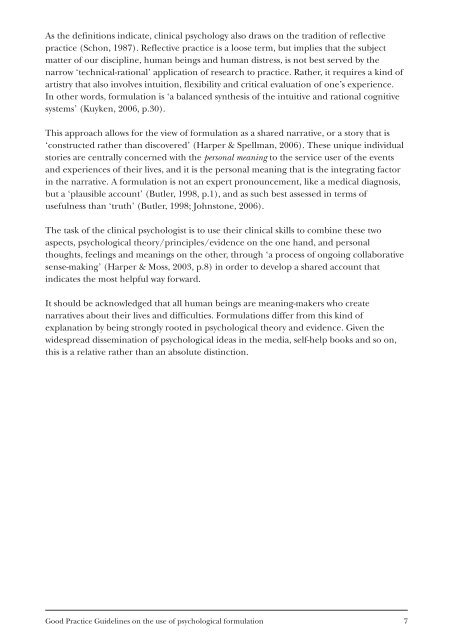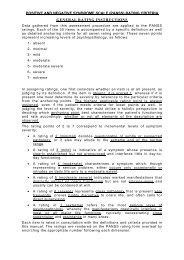6. Defining <strong>for</strong>mulationDespite the widespread use of the term in key clinical psychology documents, there is nouniversally agreed definition of <strong>for</strong>mulation, and different professions bring their owncharacteristic perspectives to the subject (see Corrie & Lane, 2010, pp.10–12; andJohnstone & Dallos, 2006, ch.1). For the purposes of these guidelines, definitions will bedrawn from the field of clinical psychology.A recent clinical psychology textbook (Johnstone & Dallos, 2006) lists the essential featuresof <strong>for</strong>mulations across different therapeutic modalities. All <strong>for</strong>mulations:● summarise the service user’s core problems;● suggest how the service user’s difficulties may relate to one another, by drawing onpsychological theories and principles;● aim to explain, on the basis of psychological theory, the development andmaintenance of the service user’s difficulties, at this time and in these situations;● indicate a plan of intervention which is based in the psychological processes andprinciples already identified;● are open to revision and re-<strong>for</strong>mulation.(NB: The term ‘service user’ in this document may include family/carers, especially in Child andAdolescent and Learning Disability settings where systemic <strong>for</strong>mulations are commonly used.)Clinical psychologist Gillian Butler (1998, p.2) puts this succinctly:A <strong>for</strong>mulation is the tool used by clinicians to relate theory to practice… It is the lynchpin that holdstheory and practice together… <strong>Formulation</strong>s can best be understood as hypotheses to be tested.The Core Purpose and Philosophy of the Profession (<strong>DCP</strong>, 2010, pp.5-6) states:Psychological <strong>for</strong>mulation is the summation and integration of the knowledge that is acquired by thisassessment process that may involve psychological, biological and systemic factors and procedures. The<strong>for</strong>mulation will draw on psychological theory and research to provide a framework <strong>for</strong> describing aclient’s problem or needs, how it developed and is being maintained. Because of their particulartraining in the relationship of theory to practice, clinical psychologists will be able to draw on a numberof models (bio-psycho-social) to meet needs or support decision making and so a <strong>for</strong>mulation maycomprise a number of provisional hypotheses. This provides the foundation from which actions mayderive… Psychological intervention, if considered appropriate, is based upon the <strong>for</strong>mulation.Both Health Professions Council criteria and British Psychological Society criteria <strong>for</strong>training courses state that clinical psychologists should: Be able to use professional and researchskills in work with clients based on a scientist-practitioner and reflective-practitioner model thatincorporates a cycle of assessment, <strong>for</strong>mulation, intervention and evaluation (HPC, 2009; BPS, 2010).The influence of our core professional identity as scientist-practitioners can be seen in theemphasis, in these definitions, on applying psychological principles and theory in order todevelop hypotheses about service users’ difficulties. The assumption is that this process willrender even the most unusual or disturbing behaviour and experiences understandable:‘…at some level it all makes sense’ (Butler, 1998, p.2).6 Division of Clinical Psychology
As the definitions indicate, clinical psychology also draws on the tradition of reflectivepractice (Schon, 1987). Reflective practice is a loose term, but implies that the subjectmatter of our discipline, human beings and human distress, is not best served by thenarrow ‘technical-rational’ application of research to practice. Rather, it requires a kind ofartistry that also involves intuition, flexibility and critical evaluation of one’s experience.In other words, <strong>for</strong>mulation is ‘a balanced synthesis of the intuitive and rational cognitivesystems’ (Kuyken, 2006, p.30).This approach allows <strong>for</strong> the view of <strong>for</strong>mulation as a shared narrative, or a story that is‘constructed rather than discovered’ (Harper & Spellman, 2006). These unique individualstories are centrally concerned with the personal meaning to the service user of the eventsand experiences of their lives, and it is the personal meaning that is the integrating factorin the narrative. A <strong>for</strong>mulation is not an expert pronouncement, like a medical diagnosis,but a ‘plausible account’ (Butler, 1998, p.1), and as such best assessed in terms ofusefulness than ‘truth’ (Butler, 1998; Johnstone, 2006).The task of the clinical psychologist is to use their clinical skills to combine these twoaspects, psychological theory/principles/evidence on the one hand, and personalthoughts, feelings and meanings on the other, through ‘a process of ongoing collaborativesense-making’ (Harper & Moss, 2003, p.8) in order to develop a shared account thatindicates the most helpful way <strong>for</strong>ward.It should be acknowledged that all human beings are meaning-makers who createnarratives about their lives and difficulties. <strong>Formulation</strong>s differ from this kind ofexplanation by being strongly rooted in psychological theory and evidence. Given thewidespread dissemination of psychological ideas in the media, self-help books and so on,this is a relative rather than an absolute distinction.Good Practice <strong>Guidelines</strong> on the use of psychological <strong>for</strong>mulation 7



